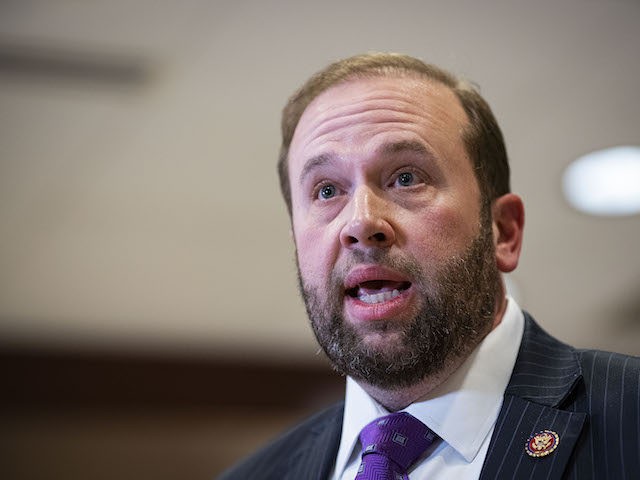House Ways and Means Chairman Jason Smith (R-MO) told Breitbart News in an exclusive interview on Monday that he believes the Republican debt ceiling plan would have a “huge” impact on inflation.
Smith spoke to Breitbart News as Speaker Kevin McCarthy (R-CA) and President Joe Biden will meet in person on Monday to discuss a potential debt ceiling deal. Republicans hope to enact most or all of their House-passed debt ceiling bill, the Limit, Save, Grow Act of 2023, in the compromise legislation.
Smith said that he believes that Americans will see “much more progress” toward a debt ceiling deal this week, given Biden’s history of negotiating debt limit deals with Republicans.
The Missouri conservative said that the Limit, Save, Grow Act of 2023 would have a huge impact on inflation because it was created “because of reckless government spending of one-party Democrat rule under Joe Biden, Nancy Pelosi, and Chuck Schumer.”
He continued, “Inflation was 1.4 percent in Joe Biden’s first month of office, and then they went on a $10 trillion spending spree which has led to inflation increasing the 14.9% since Joe Biden has taken the oath of office. The Limit, Save, Grow Act will cut spending by $4.8 trillion over the next 10 years with the spending caps; they will also rescind unobligated COVID dollars and also put work requirements to help with the labor shortage. All of these things will help decrease inflation.”
The initial Congressional Budget Office (CBO) analysis of the Limit, Save, Grow Act found it would reduce the deficit by $4.8 trillion over the next ten years. The CBO found the bill would create the following savings:
- The bill’s cap on discretionary funding would result in savings of $3,194.5 trillion over ten years
- Scrapping energy tax credits would save $569.5 billion
- Reducing funding for the IRS would save $119.7 billion
- Implementing work requirements [for] Medicaid, Temporary Assistance for Needy Families (TANF), and the Supplemental Nutrition Assistance Program (SNAP) would save $120 billion
- Rescinding funding for unspent coronavirus aid would save $29.5 billion
- Requiring the Department of the Interior (DOI) to conduct oil and gas leases would save $3.4 billion
A recent Associated Press-NORC poll found that a majority of Americans want the debt ceiling to be raised “only if lawmakers include terms on reducing the federal budget deficit.”
Biden, during these debt limit negotiations, has continued to push for higher taxes. However, Smith has contended that the federal government has raised a record level of revenue, meaning that America’s deficit problem is a spending problem, not a revenue problem.
Smith explained, “We don’t have a revenue problem. We have a spending problem that he’s looking at. Last year, our revenue was at historic levels of over $4.9 trillion that came into the government, in fact, almost a trillion dollars more than what the Congressional Budget Office scored. That would be after the passage of the Tax Cuts and Jobs Act. The Democrats are always railing against our tax cuts from 2017. But we are even exceeding the projections of Joint Tax [Joint Committee on Taxation, or JCT] and CBO by almost a trillion dollars more money than what was expected after passage of the Tax Cuts and Jobs Act. We have had a spending problem in the last three years. You’ve seen discretionary spending increase by more than 40%, more than 40%. And what we’re asking them to limit is just go back to the fiscal year 2022 spending levels, which is what we were spending six months ago. December of last year is what we were spending in fiscal year 22 levels.”
House Speaker Kevin McCarthy has discussed the potentially disastrous effects of not tackling the nation’s deficit in an interview with Breitbart News Washington Bureau Chief Matthew Boyle:
Video Source: Matthew Perdie / Breitbart News, Jack Knudsen / Breitbart News , Zenny Phuong / Breitbart NewsSean Moran is a policy reporter for Breitbart News. Follow him on Twitter @SeanMoran3.

COMMENTS
Please let us know if you're having issues with commenting.